I count this as a success that my tot collects rocks. Be still, my heart. ❤


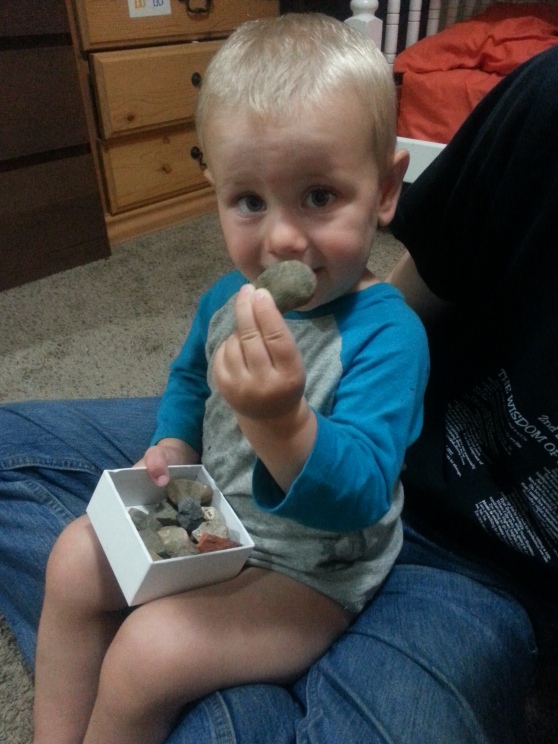
I count this as a success that my tot collects rocks. Be still, my heart. ❤



Today I laboriously read through a Serbian retelling of “The Little Mermaid”… Mala Sirena. In that version, the imposter who the prince almost marries has no explicit relation to the sea witch. And the prince and the mermaid walked on the beach on the morning of the wedding day, got mauled by a giant wave, and long story short… the mermaid saves him, he realizes SHE was the one who actually saved him from the storm, professes undying love, and he marries her instead of the other unnamed woman. So I started to wonder about the other woman. Then I wrote this.
I was sane once. And I’d still be sane, if it weren’t for her. You see, I was this close to marrying the handsomest prince around. Sure, when we first met, he got all excited and was sure I’d somehow saved him from drowning in a storm-tossed sea and declared that we should get married ASAP. He was the crazy one back then.
But who was I to complain? Sure, if anyone had saved his life that stormy night, it sure wasn’t me. I never said I did, but it’s not like I’d dissuade the guy from randomly deciding to make all my mortal hopes and dreams come true. He might’ve been a little half-baked, but he was a nice, good-looking guy. Not to mention rich and powerful! So of course I went along with the whole thing, laid on the googly eyes and everything even though I hardly knew the guy… and before I knew it, I had grown to genuinely like him. What wasn’t to like?
Soon I was all decked out in a wedding gown FAR fancier than I’d ever dreamed of wearing, and in a matter of hours, we’d exchange the vows. Life complete, right?
Except then, just hours before the nuptials, my prince goes walking along the beach with some other girl. They’d found this one naked on the shore one day shortly after the prince’s storm incident, and nursed her back to health. She never spoke, but she was always following my prince everywhere.
I’d assumed it was a completely platonic relationship, of course, because I was a trusting fiancée, but I was a fool. I mean, what man takes a morning stroll on the beach with another woman ON HIS WEDDING DAY?! My prince, apparently. Completely, incontrovertibly inappropriate.
Anyway. They’re on the beach, and for some reason the ocean decides it’d be funny to surprise them with a gigantic wave which pulls them out to sea. (Personally, I’ve never seen such a big wave, so I’m not even sure she didn’t hocus-pocus him, but hey, that’s the story everyone believes.)
And so he’s drowning in the ocean again (he claims he can swim, ha!) and she somehow saves him while wearing a big poofy dress, so of course my crazy prince gets the idea that it wasn’t me who prevented his death in the depths of the ocean, but this girl. Yeah, you read that right, the girl they found half-dead on the beach is his miraculous savior. My prince starts babbling about he knew it was her who saved him all along and how much he loves her, and only her…
Of course, recognizing her opportunity to get rich and famous, she suddenly starts talking again. Who knew she was faking muteness the whole time? And she tells him this obviously untrue story about how she used to be a mermaid—of all things!—and she, not I, saved him from that terrible storm. And because she’d fallen in love with his unconscious and waterlogged highness, she went and bothered a sea witch to make her human so she could woo him. The sea witch took her voice as payment, though, and she’d been unable to profess her love. And she whined that because he had almost married me instead, she had been sure she’d die of a broken heart and turn into sea foam. Yeah. Riiiight.
But he totally bought it! Hook and line. And because he bought it, so did the rest of the kingdom. Including the wedding guests.
And, rude, he didn’t even cancel the wedding. He got married that day, even though he was completely soaked through. But he didn’t marry me. He married her. Dumb, insignificant her. She’s so insignificant, I don’t even remember her name.
I happen to know, however, that they’re not going to get their happily ever after.
You see, they almost didn’t let me keep the wedding gown, but she is like six sizes smaller than me. So I still have that gown.
Oh, yes, and I’m still wearing it. And I won’t take it off. No way.
Not until I get rid of her.
And get my prince back.
And then we’ll live happily ever after.
I just wanted to add some pictures from my latest foray into nature journaling. I did these today while trying to calm down from a panic attack. Hope you enjoy them.



Today was an exciting day. A very, very exciting day. We got a big box of books shipped directly from Serbia. Here’s the loot: (top) a folktales book, a fairy tales book, two epic poetry books, (bottom) two anthologies of short stories and poems, a picture dictionary, and a poetry collection. They’re all gorgeous and absolutely beautiful. (If you’re eagle-eyed, you’ll see in the picture below that the dictionary uses a different alphabet than the seven other books in the picture, but it’s all good: Serbian is funny and uses both Cyrillic and Latin alphabets interchangeably.)
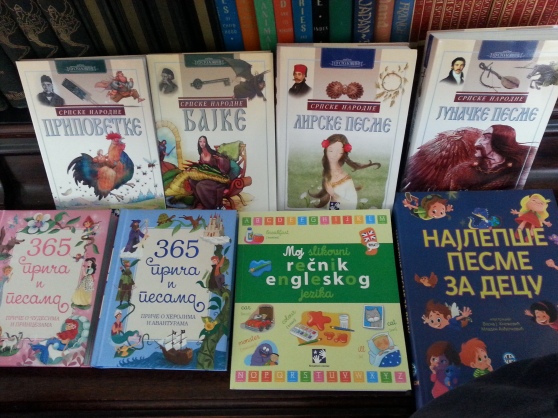
Part of the reason I’m so excited is that it is hecka difficult to find ANYTHING in the Serbian language here in the United States.
And, due to the fact that we have a fluent Serbian speaker in the home… we elected to teach Serbian as our first foreign language in our homeschool. (I have delusions that Serbian will go well enough for the next few years that I can add in Spanish in Jadzia’s fourth grade, too, but let’s actually experience the next three years before I get carried away with that idea, aye?)
That’s right, Rocketman is fluent in Serbian. He served a proselyting mission in Serbia once upon a time, and learned the language better than many American missionaries do. And when planning my children’s education I just cannot ignore the advantage of having an honest-to-goodness fluent speaker available for heart-to-heart talks in the home every night and weekend, despite the complete lack of printed resources for this specific language.
So. Over the last year for Jadzia’s kindergarten, we’ve been having lessons with a native speaker via Skype who also happens to have some sort of degree in Serbian language and literature. I’m not clear how the university system works in Eastern Europe, so I can’t say if her degree is equivalent to a bachelor’s, master’s or doctorate, but we’re friends now so I can’t say it really matters. She knows enough and cares enough to be a grammar nazi to other native speakers, so she gets a gold star of approval from me.
I take advanced (okay, okay, intermediate… like… B1-B2 level) lessons from her a couple times a week, and then the kids get one short lesson weekly as well. That lesson is very light-hearted with lots of games and songs, and stuffed animals and toy cars and airplanes… You get the idea. It’s adorable.
(By the way, if you’re looking for a native tutor in any language, try italki.com. The prices are absolutely fantastic considering that you’re getting private lessons. Cue heavenly angelic choirs. You’re welcome. Also, that’s a referral link. We both get $10 in credit if you have a lesson there using my referral. You’re welcome again. Cha-ching!)

So anyway…
Back to the books. The beautiful, glorious, wonderful books. Real Serbian books. (Did I mention they’re from Serbia?)
They weren’t super duper cheap to ship across the globe, but I decided to splurge on them at the same time as I shipped an entire box of books for the fluent husband’s birthday, too. (Shhhh.) Because I have some curriculum planning to do.
I got the selection of books I did because Jadzia is starting first grade next year and she’s ready to up her game in Serbian once we start formal academics. (And hey, it’s possible the little boys are ready too, but I’m not going to push them. One doesn’t even speak fluent English yet.)
But that means I essentially have to design my own Serbian curriculum. And I’m aiming for the kids to be fluent and reading actual Serbian literature by the time they graduate high school.
*crickets*
Okay, okay, deep breaths, self. We can do this…
Since I’m a Charlotte Mason fangirl to the extreme, I simply must show you this site: Becca at Mason’s Living Languages has done a lot of research for us already, which means I owe that woman a debt of eternal gratitude. All I have to do is do what she says, riiiight?
What am I supposed to do, Becca? TELL ME WHAT I’M SUPPOSED TO DO. Oh. Thank you, Becca. Something like four super short (10- to 15-minute) lessons a week, where one of those is a song. And Becca even explains how to do the lessons. Thaaaank you, Becca. I love you, Becca. HAVE SOME CHOCOLATE, BECCA. MY TREAT.
So anyway, our Skype tutor totally has the conversation and games covered. I just need to fill in with Gouin series (I’ll explain in a mo’), poetry and nursery rhymes, short stories, and songs.
The Gouin series is basically acting out everyday actions while explaining aloud what you’re doing: “I pick up my toothbrush. I put toothpaste on my toothbrush. I brush my teeth. I spit. I rinse.” I admit I got Cherrydale Press‘ Spanish books last year so I could steal their plenitude of series ideas. I’ll have to translate them myself into Serbian, unfortunately. Fortunately, I’ve got both Rocketman and my native tutor to double check ’em all for correctness.
As for the songs, I’ve got plenty of those already. All hail the mighty YouTube. Oh, and all hail the mighty native tutor who knew what to search for on YouTube, I guess.
As for the poetry and short stories… Well, I didn’t have any of those.
Hence the books. From Serbia.
Look, poetry! And nursery rhymes!

And look! Beautiful short stories! (I didn’t photograph the very shortest, simplest stories, but I’ll start with those.)


And since I was splurging, look at this beautiful picture English dictionary. Of course, I don’t need it to learn English… But since they have entire beautiful sentences with the vocabulary in both English AND Serbian, I can use the dang thing in reverse.
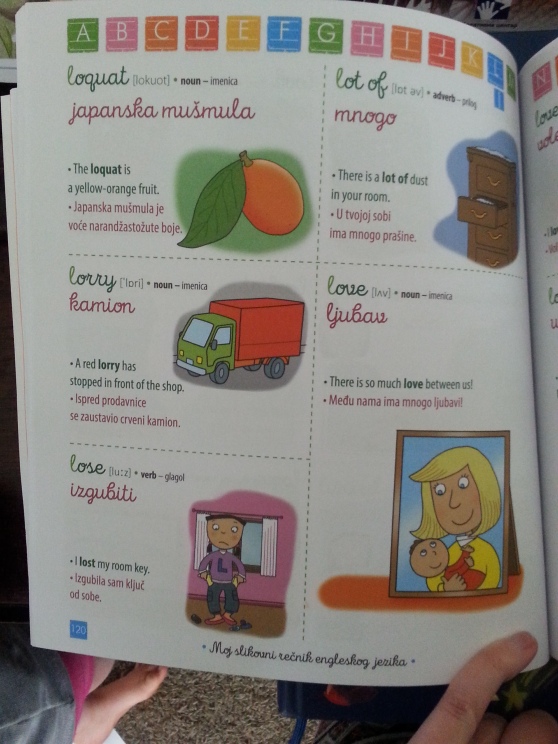
Of course there are some… interesting entries… like, loquat. Which is japanska mušmula in Serbian, apparently. Whatever. It’s still lovely. And hecka useful.
So anyway, I’m excited (!!!) but I have my work cut out for me. Translate some Gouin series. Pick out some appropriate rhymes and poems, fairy tales and folktales that the kids might be able to grasp. I am hoping to get most of the work done during the next half-year. And then, come the start of the school year, jump in with open-and-go plans.
AHHHHHHH


I suppose, technically this review should be entitled the Foundation trilogy—three books, not just one. Foundation (1951), Foundation and Empire (1952), and Second Foundation (1953). In my mind, they belong together. It’s supposedly the best science fiction series of all time. It’s a grand favorite.
Perhaps that was the problem. I was expecting it to be more mind-blowing. Or it could be because I have found, after reading lots of Asimov, that he can’t surprise me, not much anyway. I’m pretty good at spotting his hints. That might’ve lessened the impact a little, too. Oh, and I am super unimpressed by his portrayal of female characters… the only one that seemed remotely believable was a dumb, naive teenager. Sigh.
Okay, okay, so the plot itself. I was grateful these weren’t action books. I don’t focus well during action scenes. No, the excitement is more along the lines of galactic peril. Once upon a time, there was a brilliant scientist. In those days, there were so many people spread across the entire galaxy: roughly 25 million inhabited worlds. If we’re conservative and guesstimate a billion people on each planet, that’s… a lot of people. Some quadrillions. In Asimov’s universe, that means there are so many people that it’s been possible to create the science of psychohistory: the prediction of the actions of giant masses of people. No, he can’t predict what any single person will do. But quadrillions of people? 1,000,000,000,000,000 people? An accomplished psychohistorian could make some pretty darn good predictions. Okay, okay, I can see that being plausible.
And here’s the thing. The Galactic Empire was going the way of the Roman Empire: that is, falling. Decay. Ruin. Some psychohistorian sees it happening. No, he can’t prevent it. It’s too late. And the kicker: he predicts 30,000 years of Dark Ages due to this great fall. Loss of basic technology, all that jazz… but hey! He’s a smart cookie and enacts a great plan that will shorten the Dark Ages to only 1,000 years instead of 30,000. Cool. That’s what this is about.
The first book: Wow, he’s so brilliant, he predicted the actions of the Galaxy for hundreds of years!
The second book: Oh, crap. There’s a mutant individual and he’s ruined everything. Nooooooooo
The third book: Oh, but wait! All is not lost! There’s more to the plan! Wait, what do we care about the future? What about us? Booo, down with the plan!
I can see with science fiction nerds like it. It ties up neat and tidy because of sheer brilliance and cleverness. My verdict: I’m sure I would’ve liked it better if I didn’t figure out all the surprises right off the bat, because this is obviously a groundbreaking work in science fiction. I’m glad I read it, even if I’m still a little annoyed this was crowned as the best sci-fi/fantasy series ever over The Lord of the Rings. (We all know that’s blasphemy, right? Right? Good.)


Okay, so Patrick Rothfuss has the most beautiful prose I’ve ever read in a modern writer. It’s distinctly musical. I saw a quote somewhere to the effect that no one can write music like Rothfuss can. And of course, they don’t mean composing pieces of music, they mean writing music with words. It’s like word synesthesia.
This is a very worthy addition the gigantic world of fantasy. I’m not sure what to say about the story itself, though, without being spoilery, so I supposed I won’t. I did like the story, but it was emotional high, then low, then high, low, sky high, abyssmally low… over and over again. In the comfort of my cozy blankets I was okay. But Rocketman read this book on a hot, crowded bus, and if his account isn’t exaggerated, he nearly fainted trying to read this book in an environment like that. So he laid down in the aisle of the bus so as not to lose consciousness. I don’t think I’ve ever heard of a book doing that to a person, so I’ll just leave that there for you.
Oh, and when DH saw that I was reading it, he was either begging me to read it aloud… or, when my voice went kaput hours later, he peeked over my shoulder and read along. (Jerk. Just kidding, husband. Kind of.)
So. It’s a beautiful book. And the 10th anniversary edition we have is full of beautiful illustrations, and, if I may say so, it’s a stylish physical book as well. Rather striking. The beauty of the book itself, combined with the fawning of an entire bookstore’s worth of fans (during a signing for a book by a different author), and the impact the the very first page alone convinced me to shell out roughly $40 for it. Heh. What can I say, I have a weakness for books.
That’s the real reason I read it.
The secondary reason was to count it in Amy’s Modern Classics Challenge 2018 as my selection for the fiction category. This beauty of a book absolutely has an honored place on my shelf, and it’s certainly among the best fantasy books I’ve ever read. (It’s certainly a shame the trilogy isn’t finished up yet.) I have no doubts at all that this book will continue to be read for centuries. So: the verdict? Definitely a classic.

So I’ve been on an Asimov kick lately, and I also signed up for Karen’s Back to the Classics challenge, which means I needed to read a classic crime story… and this is definitely a classic crime story. There was a murder, and the main character is a detective, or “a plain-clothes man” in the lingo of the novel. It totally counts! Woohoo!
I find it interesting that Asimov wanted to write a science fiction murder mystery in the first place—apparently his editor had told him that it wasn’t possible to write, because with science fiction, the mystery could only be solved by what would seem like deus ex machina to the reader… that is, by “magic” technology. I admit, I can imagine that being the case.
Can you imagine how unsatisfying that would be? Imagine if you were reading a modern murder mystery novel in Victorian times (scandalous!), and at the end the detective finds incriminating cellular tissue—say, blood—that we know must belong to the perpetrator. The detective is excited to find this, because of course, boom! There’s the DNA evidence. The perp is caught. You, the Victorian reader, would feel confused and kind of jipped, though. What kind of ending is that?! That’s not a clever ending! This DNA fantasy totally ruins the story! Where’s the elegant reasoned-out evidence?
Yeah, I can see why someone might find the idea of a science fiction murder mystery to be a non sequitur.
But hey, Isaac Asimov did a fantastic job anyway. He pulled it off, and it totally worked. Sure there are fun futuristic forensic tools like cerebroanalysis, but they don’t solve the case. The detective has a robot for his partner in the investigation, but the robot doesn’t magically figure it out with his cold logic. Nah, our detective hero does! It was a very enjoyable read.

Okay, so this time through, I drew a picture for every scene. Enjoy!






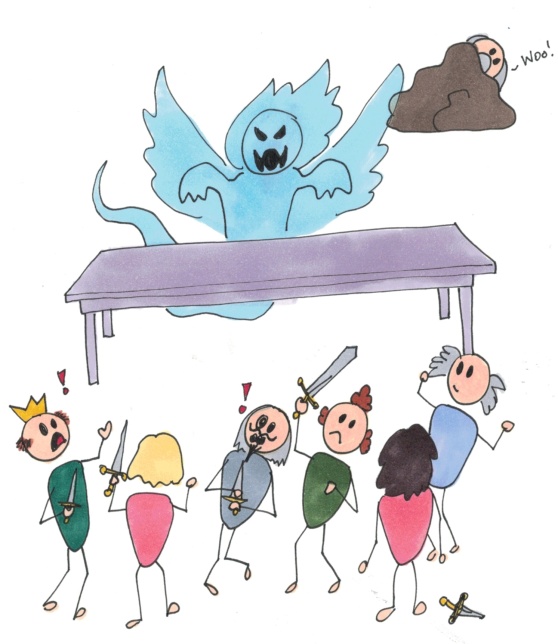


Hope you liked them!

So early Monday morning, Jadzia (5) woke up early. While the rest of us slept, she decided to go climb our tree in the backyard. It’s a fruitless mulberry.

Anyway, she discovered that despite the fact that it is early February, our tree is budding, and the buds look a bit like mulberries.

Oh, she was so excited. She ran in and woke up her brothers. “Mommy! Garak! Odo! WAKE UP! The tree has leaves and little berry things!”
The boys popped up and followed and seemed just as excited. I must confess to groggily muttering, “That’s nice, dear”, rolling over, and going back to sleep.
Eventually, though, she decided I was missing out, and drew the new leaves and buds for me.

So I finally rolled out of bed and took pictures. And then we talked about how the buds look like mulberries and the flowers even look like mulberries, and that the flowers could eventually be berries themselves!

It was an educational morning. I’m excited to see my budding natural scientist grow!

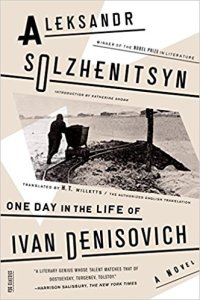
This is the first novel I’ve read by Solzhenitsyn, though I’ve heard good things about his writings. I didn’t know what to expect, except that it was a fictional man’s experience in the Soviet gulag camps… and that although fictional, it was based on the author’s own experience in the gulag.
I hadn’t read anything about the gulag before. I had read some things about the Nazi Holocaust; all those were written with the overwhelming message that “you need to know how terrible, awful, horrific this was–let me show you the horror”. And that mood pervades the works I’ve read about the Holocaust.
I was expecting the same thing here.
But… that’s not what this book feels like. Oh no, it’s worse than that.
Reading this one, you’re overwhelmed by how normal it all seems to the novel’s protagonist. The zeks (prisoners) in the gulag weren’t in a continual state of horror. The atrocities of the gulag system somehow became normal. And that’s ten times scarier than the “let me tell all the horrors I’ve seen” approach. Instead you read thoughts like, “Heck yes! We don’t have to stand barefoot in the snow at -40 degrees Celsuis today. Not like those poor sops over there! This might actually turn out to be pretty good day!” And “Sweet! I managed to not get thrown in the hole for ten days. I’d probably die if that happened.” And “I managed to swipe a second breakfast AND a second dinner! I actually feel almost full! What a good day I’ve just had.”
As a follow-up to this one, I’m going to read The Gulag Archipelago… or at least the first volume, because the entire thing is in three volumes and something like 2,200 pages long. I’ve heard it described as a 2,000-page scream. Unlike One Day in the Life, this is nonfictional. Solzhenitsyn wrote it after compiling records and accounts from gulag survivors. I don’t know how well I’ll manage emotionally while reading it, but it’s supposed to be THE book that once and for all revealed the horrors of communism to the world, so I’ve decided I have to buck up and read it, because it’s important to know the truth about things like this. Wish me luck.
